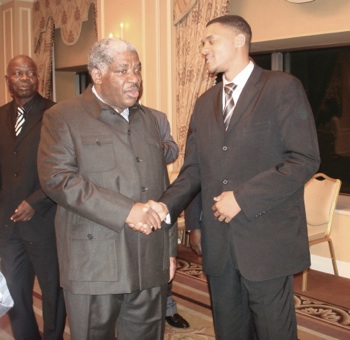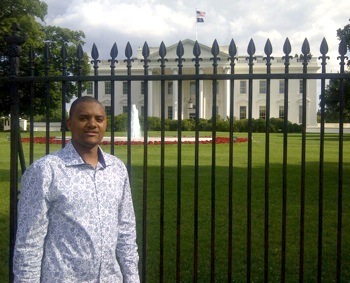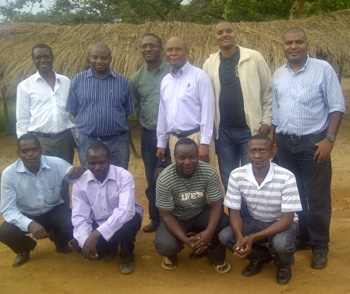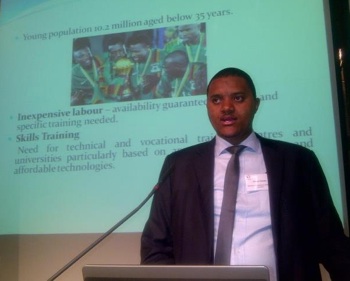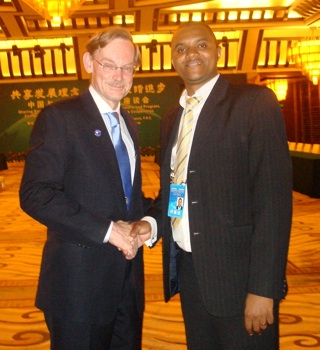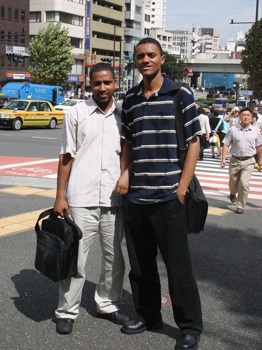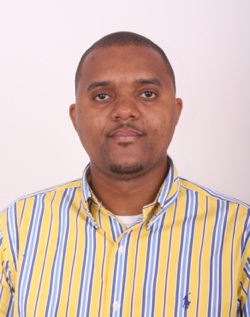 Chibwe Chisala, Zambia
Chibwe Chisala, Zambia
First Secretary (Economic and Trade)
Embassy of the Republic of Zambia in Paris
International Development Studies Program (’08)
Until his recent appointment to Head the Economic and Trade Unit at the Zambian Embassy in Paris, France, Chibwe Chisala served for over four years as a Senior Economist at one of the most important economic ministries in Zambia, the Ministry of Commerce, Trade and Industry. Chibwe joined the Ministry in June 2004 as a young Economist under the Department of Industry, mainly focusing on initiating programs and activities for industrial development in Zambia.
As a Senior Economist, his main role entailed supervising the development and implementation of industrial policies and programs in order to stimulate sustainable growth and development of Zambia’s industrial sector. In addition, Chibwe was involved in negotiating trade and investment agreements at bilateral, regional and multilateral levels. He is also gained experience in private sector development and has a passion for developing the Small and Medium Enterprises (SMEs) sector in Zambia. He was one of the pioneers of the famous “Triangle of Hope Initiative” which has brought about programs such as the much talked about Multi-Facility Economic Zones. Furthermore, Chibwe was involved in drafting Zambia’s Sixth National Development Plan (2011 – 2015) on the Trade and Industry Chapters. He was also involved in drafting Ministerial and Presidential speeches on issues to do with economic, trade and industrial affairs.
Chibwe has authored and published a number of articles on industrial development some of which could be accessed from the Institute of Developing Economies, IDE-JETRO website.
Chibwe holds a BSc in Production Management from the Copperbelt University and a Master of Arts in International Development Studies from GRIPS. He recently completed a Diploma in Project Management from Zambia Center of Accountancy Studies (ZCAS) and is currently going into his second year pursuing a Doctorate in Business Administration (DBA) from the Binary University of Malaysia/University of Zambia.
Chibwe is married to Yande Namwinga and has two lovely daughters, Mwansa and Bupe.
Please tell us about your career path so far. What is your area of specialization and how did you come to work in this area?
First of all may I take this opportunity to thank you for this rare opportunity to have me on your interview. It is indeed a privilege and such an honour to be recognised by yourselves.
Talking about my career path, I would say I have spent almost my entire professional career as a Government worker. I joined the Ministry of Commerce, Trade and Industry as an Economist in June, 2004 after spending a year with the private sector. In 2006, I was sent for studies in Japan until April, 2008. In Japan, I was required to undertake a six months internship before graduation and opted to be attached to one of the renowned think tanks of Japan, the Institute of Developing Economies (IDE).
Upon return from Japan, I was promoted to a Senior Economist position. I served in this capacity until September, 2012 when I was transferred to Ministry of Foreign Affairs and subsequently appointed to serve in the Foreign Service as a First Secretary in charge of Economic and Trade at the Embassy of Zambia in Paris.
My area of specialization includes, among others; industrial development, trade, entrepreneurship and private sector development. I think it is my passion to realize an industrial revolution in Zambia that made me come to specialize in these areas. I felt I could contribute more to the well-being of our country if I positioned myself in the area of industry and trade and hence, my decision to join the Ministry of Commerce, Trade and Industry.
You are currently First Secretary in Charge of Economic and Trade at the Zambian Embassy in France. What are your main tasks and responsibilities?
Basically my tasks and responsibilities are not that different from the ones I tackled in Zambia. The only difference is that I am now in a foreign land but I will still apply the same skills, techniques and strategies as before.
Therefore, my tasks and responsibilities at the Embassy are to carry out research, and analyzing, monitoring and evaluating economic trends in the country of accreditation in order to provide information for use in policy formulation and decision making by the Zambian Government.
In addition, I am responsible for undertaking effective economic activities, including trade and investment promotion, in order to promote increased economic co-operation between Zambia and France. Though I am currently accredited to France, I also have extra-accreditation to Spain, Switzerland and Portugal. So basically my work does not only cover France but also countries of extra- accreditation.
In your current capacity, what do you see as the main opportunities and challenges for Zambia over the course of the next five to ten years?
Starting with the challenges, I think eradication of poverty, which is currently at 63%, will be the main challenge going forward. Zambia has been growing for the past 8 years. However, economic growth is not translating into economic development, and hence the need for us to find ways of addressing this issue.
The other challenge has to do with the information gap and perception outsiders have regarding Zambia. In a number of places, Africa is considered as a “country” and the information that the investors may have about Africa is mainly about war, poverty, famine and diseases etc. So frankly speaking, such information distorts the image and business climate of the continent in general and the country in particular. So really the onus is on us to change this perception and explain that Africa’s time has actually arrived! The continent has 54 States with each country having a different environment. If anything, Africa at the moment has the highest return on investment with its economy growing at not less than 5%, the world’s fastest growing economy according to the International Monetary Fund (IMF).
Obviously Zambia like other African countries is not an island and is affected by exogenous economic dynamics such as the prevailing Eurozone crisis, among others. We have seen a number of European countries putting in place austerity measures to counteract the negative impact of this crisis. In short, the crisis poses a challenge of negative spillover effects on economic cooperation between Africa and Europe.
Besides the aforementioned challenges, Zambia has massive potential to move forward economically. Firstly, Zambia is one of the best investments destinations and has huge potential to attract investments in all its economic sectors, which currently are still unexploited. We recently sold our debut 10 year sovereign bond to a tune of US$ 750 Million although it attracted a US$ 12 billion subscription from investors. Indeed this reflects a strong investor appetite for the Zambian economy.
The country has an open economy growing at more than six percent real GDP growth over the past eight years and was ranked one of the fastest growing economies in the world in a recent report by The Economist Magazine. The country has a stable political climate and is very hospitable. For these reasons, Zambia was selected to jointly host next year’s United Nations World Tourism Organisation General Assembly. All in all, opportunities for Zambia are countlessly more than this cyber space could permit.
You recently visited Japan, accompanying Zambian President Sata. Please tell us more about this mission?
Oh yes, it was great coming back to Japan. It was my second time to return to Japan since my graduation. I was last there in June, 2008 when I accompanied our then Republican President to the TICAD IV in Yokohama. This time around, I was part of the Presidential delegation that was invited by the Japanese Government. The main mission was to strengthen the already existing bilateral relations between the two countries.
The other mission was of course to lure the Japanese investors to come to Zambia. Currently, Zambia is not getting as much investment from Japan as we would like. The Japanese investors are known to be risk averse and as such would not invest in an economy where they are not sure of. Our task therefore, was simple: to explain to the Japanese business community about Zambia’s favourable investment climate and ample business opportunities. I am glad to say that we held a very successful investment seminar which was attended by our Republican President. The seminar was coordinated by Keidanren, the Japan Business Federation, who invited more than forty fortune 500 companies, among them; Hitachi Construction Machinery Company Limited, JX Nippon Oil and Gas, JGC Corporation, Japan Airlines, Toyota Tsusho Corporation and Toshiba Corporation.
At the same function, I was given the honour by the Republican President to make a presentation on behalf of Zambia focusing on investment opportunities, which triggered a lot of interest from the Japanese business community. We hope to see an increase in foreign direct investments from Japan into Zambia in the years to come.
What are some of the biggest challenges you face in your work?
Quite frankly, one may have a lot of ideas to implement but implementation of certain initiatives and programs need to be backed up by adequate resources. As such, readily available resources may be a challenge but I am confident that with the emphasis on economic diplomacy by the Government, these challenges will surmounted.
Perhaps another challenge is to deliver a lot within a short period of time. As Zambia, we are in a hurry to develop and as such, there is a lot to do and a lot is expected from us to deliver within a specified period of time. You know as I already alluded to, currently, the poverty levels in Zambia stand at 63% and every morning when I wake up, I have to think of an idea which, once implemented, will contribute to socio-economic development of the country. But I guess with proper planning of work, we are managing!
What have been the most interesting or rewarding aspects of your career thus far?
Wow! What can I say? Quite a lot I must say. As a policy adviser, it is rewarding and encouraging to see a Ministry conceive some of your thoughts and implement them. I was key in conceptualising the development of industrial cluster program in Zambia something that I learnt with a passion from Professors Otsuka and Sonobe. This program if you asked me, has gained momentum in Zambia and serious plans are underway to put up at least one industrial cluster in more than 78 districts of Zambia based on their resource endowments. That makes me proud!
In fact I had a discussion with Prof. Sonobe who agreed to cooperate with us in implementing this program effectively.
Another interesting aspect obviously has been the exposure that I have had thus far. I have been exposed to various fora where I have interacted and exchanged ideas with high profile dignitaries. I have been to more than 30 countries within and outside Africa in a space of 6 years and I have come to appreciate different national economic setups which have really helped me in formulating policies back home.
I also served on more than ten Technical Committees appointed by the Head of the Public Service, The Secretary to Cabinet. Committees ranged from tax policy, investment, trade, industry, mining, finance, among others.
In addition to that, during my career I have taken any opportunity to learn new things. I possess a chain of certificates in various areas, including Quality Infrastructure Development, Innovation and Business Incubators, World Trade Organisation, Special Economic Zones, Small and Medium Enterprises, among others.
In a nut shell, my career has been quite interesting and rewarding.
What led you to GRIPS? What is the most important thing you got out of your studies here, and how has your experience at GRIPS prepared you for future endeavors?
Just the tranquil environment and the quality of programs and courses at the institution is what really attracted me to GRIPS. In my view, after GRIPS, it doesn’t get any better!
Responsibility, discipline and commitment are some of the things I got out of my studies and of course the skills to analyze and formulate public policies which are cardinal for a developing nation like Zambia.
What is your fondest memory of your time spent in Japan? And what do you miss most about Japan?
My fondest memories of GRIPS are the field trips we took outside of Tokyo. They were amazing. We used to spend days with a Japanese family in remote corners of Japan just to learn about their culture and livelihood.
I miss the shinkansen (bullet train), the strict time keeping and all of my former classmates. I also miss the Japanese culture and their trustworthiness – I remember dropping my wallet full of money at a train station and found it intact a day later at the nearest police station.
What is your favourite thing to do when you are not working?
Relaxing with my family at home. I have two awesome daughters who always keep me busy. They are quite a handful. I also enjoy watching soccer and a bit of some tourism.
How do you maintain a balance between your work and the rest of your life?
It is a challenge, you know the nature of my job entails that I am out of the station most of the times. If anything, I spent on average, less than 10 days a month at home as I was either abroad or out of the city on a tour of duty. But thank God I have an understanding wife who encourages me to work even harder. I also try as much as possible to utilize my free time with my family.
What advice would you give to current GRIPS students?
At GRIPS you are on your own, hence the need to be responsible, hardworking and disciplined. Besides this, make sure you explore other social aspects in Japan.
Once you graduate don’t be so content, continue learning as the world is dynamic. There is a saying which goes like this “Every morning in Africa, a Gazelle wakes up. It knows it must run faster than the fastest lion or it will be killed. Every morning a Lion wakes up. It knows it must outrun the slowest Gazelle or it will starve to death. It doesn’t matter whether you are a Lion or a Gazelle… when the sun comes up, you’d better be running.”………..Therefore, my advice to the current students is to keep running!!!!!!!
Do you have any suggestions on how to further utilize the GRIPS alumni network?
This is excellent work you are doing, Karin, and let me thank you again for giving me this opportunity. Suggestions not any, I think am fully satisfied. I Thank You. God Bless.





